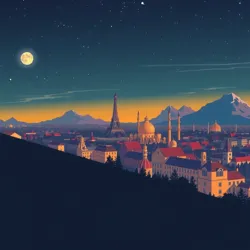Counterfactual History

Counterfactual History is an intriguing field of study that examines hypothetical alternatives to actual historical events. It involves the exploration of "what-if" scenarios, where historians and scholars speculate on different outcomes of historical events and their potential impacts on the present and future.
Definition and Scope
Counterfactual history, also known as "virtual history," is a branch of historical speculation that uses rigorous analysis to imagine how history might have unfolded differently. By altering a single event or decision, scholars can explore a range of potential outcomes and their consequences. The scope of counterfactual history includes political, military, social, and cultural events, allowing for a broad spectrum of speculative narratives.
Methodologies
The methodologies used in counterfactual history combine historical research with creative inference. Historians begin with a well-documented event and then introduce a plausible divergence, referred to as a "point of departure." They assess the potential ripple effects of this divergence through logical reasoning and historical evidence. This approach aims to maintain credibility while exploring alternate realities.
Prominent methodologies include:
-
Analytical Models: These models use structured frameworks to assess the likelihood and impact of various outcomes. By evaluating historical patterns, scholars can predict how certain changes might affect broader historical trends.
-
Scenario Building: This involves crafting detailed narratives that explore different paths history could have taken. Scenario building allows for the examination of complex interdependencies between events.
Notable Examples
Counterfactual history has been applied to various pivotal events:
-
The Cuban Missile Crisis: Scholars have speculated on the potential outcomes if diplomatic negotiations had failed, leading to a nuclear conflict. These scenarios highlight the precarious balance of power during the Cold War.
-
The Assassination of Archduke Franz Ferdinand: Alternate histories explore the possibility of World War I being averted, resulting in a drastically different 20th century without the war's extensive repercussions.
-
The Fall of the Berlin Wall: Imagining a scenario where the wall never fell, historians speculate on the continued existence of the Eastern Bloc and its global implications.
Cultural Impact
Counterfactual history has permeated popular culture, inspiring a wide range of literature, films, and games. Works such as "The Divergent Path" and "A World Unseen" explore alternate historical outcomes, often blending fact with fiction to create engaging narratives. These stories allow audiences to reflect on the fragility of history and the myriad possibilities that could have shaped our world.
Additionally, counterfactual history has influenced other creative domains, including interactive storytelling, where audiences can engage with alternate scenarios through digital media and gaming platforms.
Criticism and Challenges
While counterfactual history offers unique insights, it also faces criticism and challenges:
-
Speculative Nature: Critics argue that counterfactual history is inherently speculative and lacks the empirical grounding of traditional historical studies. This raises questions about its academic validity.
-
Ethical Concerns: The exploration of sensitive historical events, such as wars or atrocities, in counterfactual scenarios can be controversial. Scholars must navigate these topics with care to avoid trivializing real suffering.
See Also
- Historical Speculation
- The Divergent Path
- Interactive Storytelling
References
- The Divergent Path
- A World Unseen
- Interactive Storytelling
Counterfactual history offers a fascinating lens through which to examine the complexities of historical events and their potential alternate paths. By engaging in "what-if" scenarios, scholars and enthusiasts alike can gain a deeper understanding of the delicate interplay of events that have shaped our world and the vast array of possibilities that history holds.